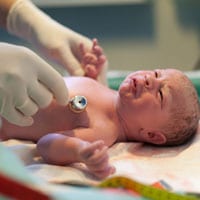Early Term Baby: Birthing Early
If you’re among the parents who gave a sigh of relief that you made it to at least 37 weeks before giving birth, you should know that if your baby was born between 37 and 38 completed weeks of pregnancy, he may still be at risk for health and developmental problems more typical of preterm babies.
Babies born between 37-39 weeks are “early term” infants and research shows their births often happen via elective labor induction from either the parent’s or the prenatal care provider’s preferences. Fact is, fewer women are willing to wait for spontaneous labor—which is healthiest for both you and your baby—to start on its own.
Nearly 1 in 6 babies (17.5%) are born between weeks 37-39, and sadly, the number of babies born at 40+ weeks has been declining in the US. At the same time, there have been marked increases in the number of labor inductions and cesarean surgeries, underscoring this dangerous trend, according to federal birth statistics.
Risks Of Early Term Birth
Polls show as many as half of all people believe that 37+ weeks is “close enough” when completing a pregnancy. But research among 40 million completed births shows early term infants are at higher risks of dying postpartum than full-term babies.
If your baby was born early term, your healthcare provider will watch for signs that he may need care in the NICU for breathing problems that may require a ventilator and feeding issues, which can delay bonding and starting breastfeeding.
As you begin to nurse your early term baby, he may have problems coordinating his sucking and swallowing. His desire to root and suck doesn’t kick in until sometime between 36-38 weeks. Experts think these babies simply are less capable of nursing well enough to meet their own needs. Your baby may end up dehydrated and needing hospitalization.
Future Problems
As early term babies have grown up and started school, researchers say these kids are more likely to need special education for learning disorders such as dyslexia, Asperger’s syndrome and ADHD. In fact, Pediatrics reports the risk of having ADHD is 20% higher among babies born at 37 or 38 weeks than babies born later.
These researchers also observed that early term babies are at increased risk for psychiatric hospital admissions during their teen and young adult years. Special education needs decrease as gestational age at birth increases. If your baby was born early term, talk with your pediatric care provider about watching for health and other developmental issues.
RELATED TOPICS
Early Term Baby: Birthing Early
Also read our range of articles that deal with how to care for your baby if she is premature, Visit Born Too Early (Prematurity)






Comments are closed.